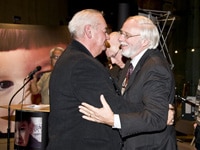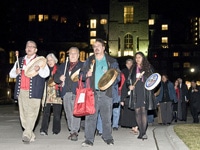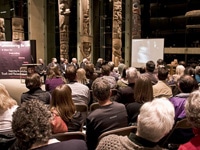“Remembering the Children” has been a sombre tour: stories of abuse in residential schools, apologies from churches, and a commitment to a long and difficult walk of healing. But when the Aboriginal and Church leaders made their second stop in Vancouver March 5, there was evidence of real hope.

“When I was invited to a ceremony called ‘Remembering the Children’ I wasn’t too excited to go to it,” Ted Quewezance, executive director of the National Residential School Survivors’ Society, confessed to the crowd of 200 at Vancouver’s Museum of Anthropology. “The last people who I thought would ever come to the plate were the churches, but as I listened to [the church leaders] in Ottawa, I cried when I heard each of them speak, and I’ll tell you, each gentleman here that represents the churches, the sincerity is there. I know there’s sincerity because I’ve talked to them.”
Mr. Quewezance, who attended an Anglican school and suffered sexual abuse for six years, is one of hundreds of Canadians who have heard the church leaders’ apologies for their involvement in the schools, and their commitment, along with Aboriginal leaders, to participate in the upcoming Truth and Reconciliation Commission, a five-year listening and educating process to uncover the legacy of residential schools.

“When people apologize from the heart it means something,” said Mr. Quewezance, “It’s something I’m going to pass on to many survivors across the country.” His remarks were met with a standing ovation and an embrace from each of the church leaders.
Program covers past, present, future
Drummers from the Musqueam band kicked off the evening with a ceremonial walk from the Vancouver School of Theology to the Museum of Anthropology. Then under a dozen towering totem poles in the museum’s great hall, the evening unfolded from “Remembering the Past” to “Moving into the Future.”
Leaders from the Anglican, Presbyterian, Roman Catholic, and United churches individually apologized for their involvement in the schools.
“In remembering the children the Anglican Church has so much for which to be so sorry,” said Archbishop Fred Hiltz, Primate of the Anglican Church of Canada.
Church leaders also shared the work that their churches have been doing for decades to improve relationships with Aboriginals. Each church is involved with a variety of projects, including producing resources like the United Church’s Circle and Cross book (to support dialogue between Aboriginals and non-Aboriginals), the Presbyterian Church’s Healing and Reconciliation Ministry, and the Anglican Healing Fund.

All in attendance were encouraged to participate in the Truth and Reconciliation Commission, either by sharing or listening to stories of residential school experiences.
“This moment is ours,” said Chief Bobby Joseph, retired executive director of the B.C. Residential School Survivors’ Society. “What we do now is crucially important to the next step.”
Churches “impatient” for commission
Rev. Hans Kouwenberg, Moderator of the Presbyterian Church in Canada, addressed his final remarks to the Government of Canada: “We in the church community are impatient for the federal government to fulfil the commitment they made in the last throne speech to apologize on behalf of the people of Canada to Aboriginal Peoples. We are impatient, and we have told them so, for the launch of the Truth and Reconciliation Commission.”
Once launched, the commission’s work will include public events and an archival centre, as well as other elements. In his address, B.C. Regional chief Shawn Atleo compared the commission to turning a difficult page in history. “It’s really heavy, this page,” he explained, holding up his hands to brace an imaginary book, “It’s going to take a lot of us to turn it.”
Later Bob Watts, Interim Executive Director of the Truth and Reconciliation Commission, described the commission as a sheet of spring ice that must be lifted up carefully by many hands so it won’t shatter.
How can churches prepare for this difficult and delicate work? In an interview after the event, Sharon Thira, executive director of the Indian Residential Schools Survivors Society, offered some reminders:
“Churches have to recognize that they can’t impose the process, they can’t manage the process, they can’t decide what reconciliation is,” she said. “I think the churches have to be open to listening, and ready to receive a lot of anger that may come their way, and I think the churches have to be sincere, and they have to challenge themselves to sustain this process over a long period of time.”
Interested in keeping up-to-date on news, opinion, events and resources from the Anglican Church of Canada? Sign up for our email alerts .
